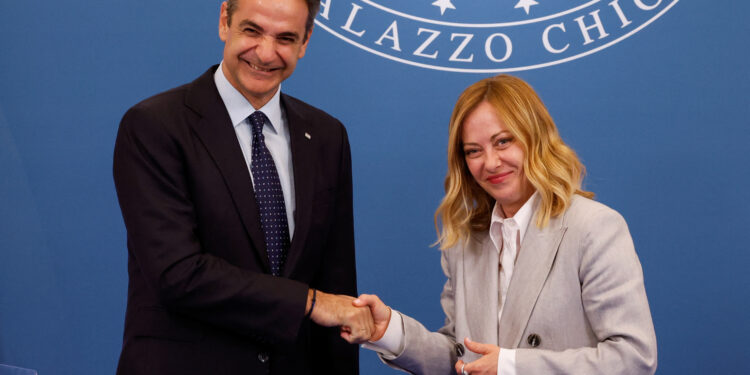Mitsotakis in Rome: €360 million rail deal – Meloni speaks of shared concerns on defence and migration

Energy and transport agreements signed
Two key agreements were signed during the summit. The first involves Greece’s Independent Power Transmission Operator (ADMIE) and Italy’s TERNA, who have agreed to upgrade the electricity link between the two countries. The planned upgrade will triple the current energy transmission capacity from 500 MW to 1,500 MW.
The second agreement is between Greece’s Ministry of Infrastructure and Transport and Ferrovie dello Stato. It outlines a plan to modernise passenger rail services in Greece, including the purchase of 23 new trains – eight high-speed intercity and 15 suburban – and the construction of state-of-the-art depots for long-term maintenance. These commitments will form part of a new contractual framework with clear delivery timelines.
These deals are among 14 agreements signed during the summit, which Mitsotakis described as a “restart” of Greek-Italian rail cooperation, particularly in light of the Tempe tragedy.
Mitsotakis: “A new chapter in Greek-Italian rail ties”
Following the summit in Rome, Mitsotakis appeared alongside Meloni to make joint statements. He emphasised that the meeting went beyond routine diplomacy:
“This wasn’t just a formal meeting – it was a genuine opportunity to coordinate on multiple levels with passion.”
He underlined the historical and economic ties that bind Greece and Italy, saying they now face shared challenges in an increasingly uncertain world.
Highlighting the sheer volume of signed agreements, he proposed more frequent meetings of the Cooperation Council and expressed a desire for broader collaboration, both bilaterally and within the EU.
He thanked Meloni personally for her role in securing the agreement and noted that while Greece is investing heavily in modernising its rail network and safety systems, Italy is contributing significantly through rolling stock and infrastructure.
Stronger economic and defence ties
Beyond rail and energy, the two leaders also discussed economic cooperation and trade. Mitsotakis expressed optimism about attracting more Italian investment to Greece.
On migration, he described Italy as Greece’s “strongest ally,” noting a shift in EU policy away from redistributing asylum seekers within the bloc.
“Now we focus on border protection, cracking down on smuggling networks, ramping up returns, and reforming legal migration channels,” he said.
On foreign affairs, he reaffirmed Greece’s support for a 30-day ceasefire in Ukraine and called for strengthening EU defence and Greek-Italian military collaboration: “There is more we can and should do in this area.”
He also stressed the importance of maintaining close ties with the United States to secure a mutually beneficial trade agreement and avoid a trade war. “We must do everything we can to keep the West united in the face of current challenges.”
Meloni: Defence, migration, and connectivity at the forefront
Speaking after the summit, Giorgia Meloni welcomed the pledge not to let another eight years pass before the next intergovernmental meeting.
“Our relations are excellent. Without our two countries, Europe would not be what it is today. We are both EU and NATO members and sit side-by-side in the European Council. Next year, we will succeed each other in the EU Presidency,” she noted.
Meloni said defence cooperation and tackling irregular migration would be prioritised. “These are areas where there is strong common ground with the Greek PM,” she said.
“We aim to keep working with Kyriakos to reshape Europe’s overall approach. We’ve already managed to shift the focus towards protecting external borders, targeting traffickers, and strengthening cooperation with transit countries.”
She reaffirmed support for a “just and lasting peace in Ukraine” and expressed hope that Russia would respond positively to the call for an unconditional ceasefire and a meeting between Zelensky and Putin.
On Gaza, Meloni advocated for urgent humanitarian aid and backed Arab-led efforts to establish a broader security framework. She also confirmed that both countries support the Western Balkans’ path towards EU membership.
In terms of economic cooperation, she highlighted joint efforts in fibre optics, as well as the Blue Med and Green Med initiatives, which aim to more than double energy connectivity between the two nations.
Commenting on the Ferrovie dello Stato agreement, she said:
“It’s an important deal that breathes new life into our strategic partnership. We’re ready to play our part fully – it sends a strong message about our commitment to working together.”
______________________________________________
Are you seeking news from Greece presented from a progressive, non-mainstream perspective? Subscribe monthly or annually to support TPP International in delivering independent reporting in English. Don’t let Greek progressive voices fade.
Make sure to reference “TPP International” and your order number as the reason for payment.